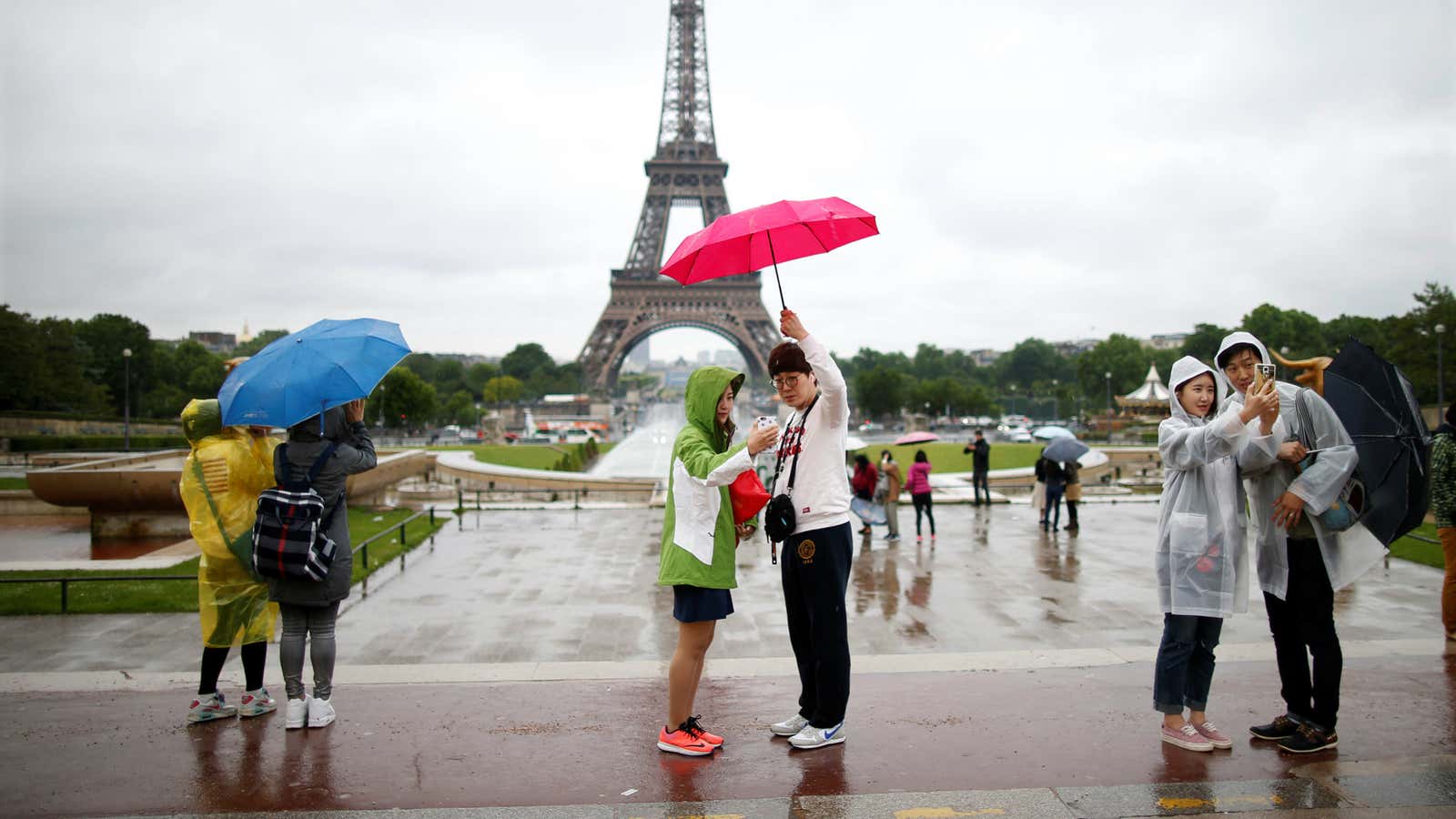Here’s the problem with getting ready for school when you’re an American teenager living in France: nothing makes sense. You drink coffee in bowls instead of mugs, eat a breakfast of baguettes with jam instead of fried eggs and bacon. Maybe you can take the train to school, but only if the SNCF isn’t on strike again, in which case you’ll have to find a bus or a parent/guardian with a car—French drivers aren’t allowed a license till age 18. Once you make it to school but before classes start, you’ll be expected to share la bise (kisses on each cheek) with all your classmates and sometimes with friends of friends. This practice, along with the question of whether to use vous (formal you) or tu (informal you) makes meeting strangers an etiquette nightmare. And then there are the high school classes themselves. French and European history everyone’s been learning since childhood. Second and third languages. Literature classes with references to Voltaire and de la Fontaine instead of Hemingway and Melville. Oh, and most of the school restrooms are unisex.
I was only 16 the year I lived abroad in France—young enough that I didn’t yet have a solid grasp on what life was all about. But I understood how to navigate small-town America. I knew which behaviors were considered rude or polite, recognized most pop culture references, and had a quasi-scientific formula for doing homework well enough to get good grades, but also have time leftover for sports and friends. Little of that knowledge carried over to France; the rhythm of life and cultural norms were different. My mistakes regularly led to embarrassment, anxiety, discomfort. There’s a reason they call it culture shock. But I was also elated by every success. I learned flexibility, openness, curiosity, and confidence. I also learned to accept myself and other people, despite our differences.
That experience is probably why, years later, I was drawn to a similar story of teenagers traveling between countries (Canada and America) and between time periods (20th-century America and 17th-century New France). These young men were on an eight-month, 3,300-mile canoe expedition that mimicked La Salle’s Mississippi River voyage, down to the French names they adopted for the duration of the journey and the hand-carved antler buttons on their wool shirts. The undertaking of such odysseys inevitably changes the participants. Like me, the men of the La Salle Expedition II encountered people of different backgrounds, with different beliefs. They learned empathy and open-mindedness and self-confidence. Perhaps one of the most valuable aspects of this journey was its emphasis on cross-cultural education, both with students from different countries and with the historic figures the men embodied.
Today, with politicians around the world using violent rhetoric to divide people based on ethnicity, language, and religion, it’s more important than ever to help teenagers develop open-mindedness and cultural awareness. What we don’t know about the world will hurt us.
Consider the fact that only 34% of Americans have passports, compared to 50% of Australians, 60% of Canadians, and 80% of United Kingdom citizens. Or the surveys that show Americans struggle to identify different countries on the map, a problem comedian John Oliver has turned into a set piece on his show “Last Week Tonight.” Then there’s our abysmal study abroad rates. For the 2013-14 academic year, only 1.5 % of American students in higher education studied abroad, while international students coming to American campuses made up almost 5% of enrollment. As American historian and cultural critic Jacques Barzun wrote, “It is a noteworthy feature of 20th century culture that for the first time in over a thousand years, the educated class is not expected to be at least bilingual.” Practicing foreign languages with native speakers, traveling to new countries, and interacting with people of different backgrounds are all opportunities for growth that most Americans miss out on.
One way to change that is to offer greater funding and incentives to students at colleges and universities, following the guidelines laid out by Sanford J. Ungar in his recent essay for Foreign Affairs. But perhaps just as valuable are individual-driven efforts, like those led by Chicago-area high school French teacher Reid Lewis.
From the start of his career, Lewis made cultural exchanges a priority. He took students to Bretagne, France for summer programs in the 1970s and offered extra credit for weekend outings during the school year. His most remarkable accomplishment was to organize the 3,300-mile canoe reenactment, recruiting mainly students to paddle the six canoes. It was a strange and ambitious project celebrating the American Bicentennial in 1976, and if measured in terms of the relationships the paddlers established with citizens along their route, then the project should absolutely be considered a success. The crew members retain fond memories of the various regions of Canada and the United States they visited, as do members of the communities who met the modern voyageurs. These exchanges educated people about 17th-century New France, but it also allowed the paddlers—especially those who were teenagers—to learn more about cultural differences across 20th-century North America.
Not everyone has the opportunity or can afford to study abroad, and it takes a certain kind of teacher to embark on an eight-month journey with his or her students. But cultural exchanges of one sort or another need to be an educational priority. We need scientists, educators, artists, and leaders who appreciate the intricacies of the world so that they can help the US better find its footing in turbulent waters. To ignore the views of cultural outsiders is as good as winning an argument by plugging your ears and shouting nonsense over the other person’s words. Well-meaning but ill-informed international intervention can cause as much harm as good. It’s time to stop focusing on the achievements of American society and consider what the world looks like from other nations’ perspectives.
